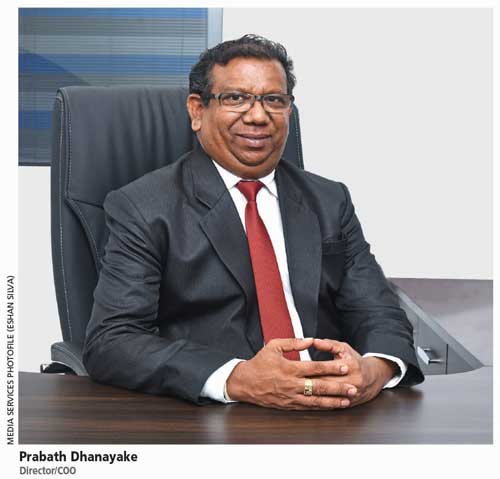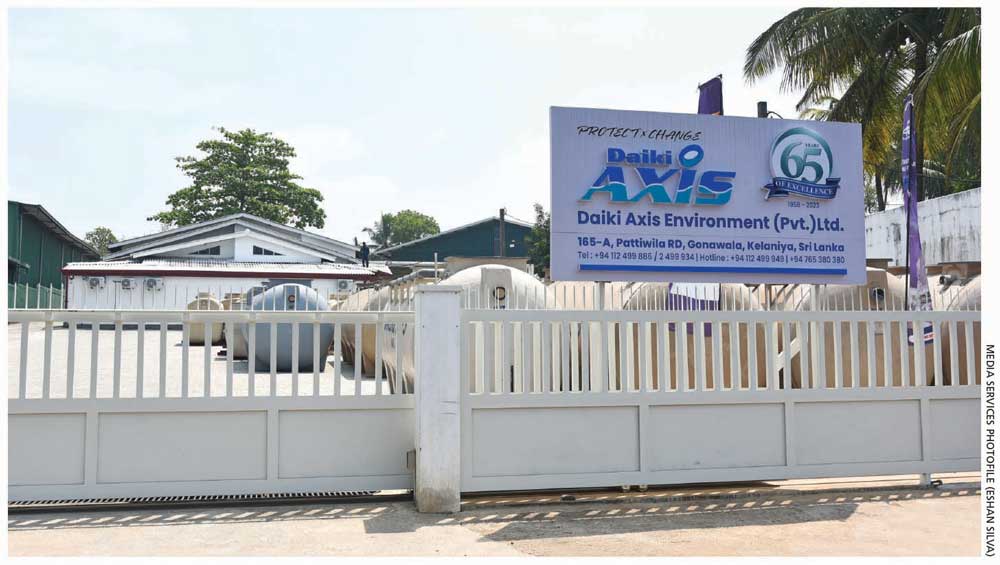DAIKI AXIS ENVIRONMENT
 Q: What factors influenced Daiki Axis’ decision to establish Johkasou in Sri Lanka?
Q: What factors influenced Daiki Axis’ decision to establish Johkasou in Sri Lanka?
A: I brought the Johkasou wastewater management system to Sri Lanka after being inspired by its effectiveness in Japan. Despite initial doubts about its viability in Sri Lanka due to the cost and unfamiliarity, I persisted because of my passion for environmental conservation. The success of the Johkasou system in Japan, where it significantly improved water quality, motivated me to introduce it to Sri Lanka.
Having faced challenges in selling the product initially, I received the support of friends and some government officials in establishing some units. Through perseverance, the product gained traction in the market.
I was drawn by Daiki Axis’ focus on environmental impact over profit and this led me to establish this organisation in Sri Lanka. As sales grew, Daiki recognised the potential and decided to establish a manufacturing plant in Sri Lanka.
Daiki Japan valued the strategic location for transshipment to other regions and appreciated the local work ethic. Through my facilitation, we established Daiki Axis Environment Sri Lanka, with me appointed as the CEO.
However, the construction of the plant faced delays due to unforeseen events such as the 2019 Easter Sunday attacks and COVID-19 pandemic. Daiki’s commitment to its promises and support even during challenging times demonstrated our reliability and integrity.
Q: And what challenges did you face when introducing Johkasou – and how did you overcome them?
A: Initially convincing Sri Lankans about the effectiveness of Johkasou posed a challenge due to its high cost and unfamiliarity. However, leveraging personal contacts, and emphasising the long-term performance and reliability of the product helped alleviate concerns and build trust.
During the pandemic, despite lockdown restrictions while business slowed down, we continued maintenance activities.
Additionally, amidst the economic crisis, foreign funding agencies recommended Daiki Axis as an environmentally-friendly organisation, leading to over 500 successfully completed projects.
Maintaining a strict policy of delivering quality products regardless of pricing ensured credibility and garnered recommendations from foreign funding agencies. Notably, the United Nations Human Settlements Programme (UN-Habitat) and Korea International Cooperation Agency (KOICA) recognised the importance of wastewater management, which further solidified our reputation.
These efforts led to increased awareness and adoption of the Johkasou system in Sri Lanka. The surge in demand reflects a shift towards prioritising package plants for wastewater management – a concept previously unfamiliar to us.

Q: How did you navigate the tough economic conditions and prevent them from affecting business operations?
A: In our approach to business, maintaining ethical standards has always been paramount, even if it meant facing short-term difficulties. While some customers may be dissatisfied with the high prices initially, Daiki’s unwavering commitment to delivering quality and accurately sized products ensures long-term satisfaction, and avoids the pitfalls of budget overruns and ineffective solutions.
Wastewater management, often brushed off as a secondary concern in projects, can have significant repercussions if not addressed properly. Many overlook the importance of performance and focus solely on costs, leading to regrettable outcomes down the line.
However, Daiki never compromises on quality or pricing, ensuring that customers receive the best value for their investment.
Despite the challenges posed by the complexity of wastewater management solutions, our transparent and honest approach has earned the trust and belief of all customers. While some competitors may exploit the lack of understanding among customers to offer cheaper but inferior products, Daiki’s dedication to doing things right has established us as a reliable and trustworthy partner in the sector.
By consistently adhering to ethical business practices and prioritising customer satisfaction over short-term gains, we have earned the respect and loyalty of our clientele, paving the way for continued success and growth in the wastewater management sector.
Q: In what way has the establishment of the plant in Sri Lanka contributed to Daiki Axis’ overall growth strategy?
A: Since establishing the manufacturing plant, Daiki has gradually expanded its production capabilities. Currently, we manufacture products with capacities of up to 10 cubic metres locally with plans to offer a full range by the end of the year.
This move has substantially reduced costs with approximately 60-65 percent of components now produced domestically. However, critical components such as wells, aerators and specialised media are still imported from Daiki Axis, the parent company.
Despite economic challenges, we maintained stable pricing for customers, absorbing increased costs to ensure affordability.
Daiki’s success has also led to increased exports with plans to achieve the US$ 1 million mark this year and an annual target of five million dollars. Our export destinations include Pakistan, the Maldives, Myanmar, Nepal, South India, Kenya, Madagascar and various Middle Eastern countries.
However, challenges persist particularly in manufacturing larger plants due to technical issues and tax regulations. The customs duty structure affects us at times, leading to the import of fully assembled products instead of manufacturing locally.
Despite these obstacles, leveraging export opportunities has facilitated company growth and allowed for competitive pricing, ultimately contributing to our success and expansion plans.
– Compiled by Tamara Rebeira
COMPANY DETAILS
Telephone: 2499949 | Email: infolanka@daiki-axis.com | Website: www.daikiaxis.lk



